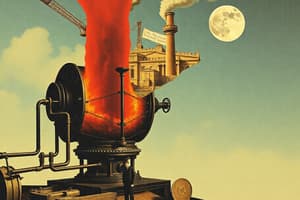Podcast
Questions and Answers
What does the First Law of Thermodynamics state about energy during an interaction?
What does the First Law of Thermodynamics state about energy during an interaction?
- Energy can be created and destroyed depending on the system.
- The quality of energy increases in all interactions.
- Energy changes forms but the total remains constant. (correct)
- Energy can only be transferred as work, not as heat.
Which of the following best describes the Second Law of Thermodynamics?
Which of the following best describes the Second Law of Thermodynamics?
- Processes tend to occur towards increasing energy quality.
- Energy has both quality and quantity, favoring a decrease in quality over time. (correct)
- All energy transitions result in zero effect on temperature.
- Energy can be fully converted into work without losses.
In thermodynamic systems, what characterizes an 'open system'?
In thermodynamic systems, what characterizes an 'open system'?
- Only energy can enter while matter is contained.
- Both energy and matter can freely interact with the surroundings. (correct)
- No energy or matter can enter or leave the system.
- It is a system under constant volume with no change in temperature.
What is the primary role of the boundary in a thermodynamic system?
What is the primary role of the boundary in a thermodynamic system?
Which application exemplifies the transformation of energy in engineering practices?
Which application exemplifies the transformation of energy in engineering practices?
Which statement best represents the First Law of Thermodynamics?
Which statement best represents the First Law of Thermodynamics?
Which of the following is NOT considered a thermodynamic property of substances?
Which of the following is NOT considered a thermodynamic property of substances?
What does the Second Law of Thermodynamics imply about energy transformations?
What does the Second Law of Thermodynamics imply about energy transformations?
In engineering applications, which of the following exemplifies an energy transformation?
In engineering applications, which of the following exemplifies an energy transformation?
Which of the following statements correctly describes energy transformations in refrigeration cycles?
Which of the following statements correctly describes energy transformations in refrigeration cycles?
Flashcards are hidden until you start studying
Study Notes
Thermodynamics: An Engineering Approach
- The conservation of energy principle is a fundamental law of nature.
- Energy can change forms during interactions, but the total amount remains constant.
- Energy cannot be created or destroyed.
- This is the first law of thermodynamics.
- The second law of thermodynamics states that energy has both quality and quantity, processes tend to decrease the quality of energy.
- Thermodynamic cycles include:
- Heat Engines
- Refrigeration cycles
- Thermodynamics is the science of energy and energy transformations.
- The course will cover:
- Understanding energy and energy transfer
- Basic thermodynamic properties of substances
- The relationship between heat and work in systems
- Applications of the First Law of Thermodynamics
- Applying the First Law of Thermodynamics to closed and open systems
- The Second Law of Thermodynamics and its applications
- Classical and statistical definitions of entropy
- Thermodynamic cycles
- Analyzing heat engines and refrigeration cycles
- The recommended textbook is "Thermodynamics: An Engineering Approach" by Cengel and Boles.
Energy and Energy Systems
- Energy sources include:
- Coal
- Natural Gas
- Oil
- Nuclear fission
- Hydro
- Geothermal
- Solar
- Wind
- Biomass
- Waste
- Fusion
- Energy systems include:
- Aircraft gas turbine
- Stationary gas turbine
- Steam power plants
- Nuclear power plant
- Refrigeration and air conditioning
- Auto and truck engines
- Locomotives
- Small engines
- Chemical process plants
- Fuel cells
- Compression systems
Thermodynamic Systems
- A system is a quantity of matter or a region in space chosen for study.
- Surroundings are the mass or region outside the system.
- The boundary is the real or imaginary surface that separates the system from its surroundings.
- The boundary can be fixed or movable.
Assessment
- The course grade is comprised of:
- Midterm Exam (20%)
- Quizzes (30%)
- Labs (15%)
- Final Exam (35%)
- There are 3 quizzes:
- Quiz 1 (10%)
- Quiz 2 (10%)
- Quiz 3 (10%)
- There are 3 labs:
- Lab 1 (5%)
- Lab 2 (5%)
- Lab 3 (5%)
Attendance and Punctuality
- Students absent for 25% or more of class time, tutorials, labs, and/or office hours may be advised to drop the course if absences occur before the drop date.
- They may receive a failing grade or an incomplete grade if absences are due to an approved, documented illness or emergency.
Thermofluids I: Thermodynamics
- The course is taught by Dr. Ahmed Hassan.
- His email address is [email protected].
- His office is B317.
- The course includes 2 lectures and 1 lab per week.
- Attendance is mandatory.
- Problem solving sessions occur during lab hour in B327.
- Office hours are on Tuesdays from 12:45pm to 2:30pm and Thursdays from 12:45pm to 1:15pm.
Learning Outcomes
- By the end of the lecture, students will:
- Understand the course outline and important dates
- Understand the textbook, chapter 1-1 to 1-7
- Understand the main rules applied in the course
- Understand the main content of the course
- Understand basic thermodynamic concepts
- There are three quizzes during lab time.
Studying That Suits You
Use AI to generate personalized quizzes and flashcards to suit your learning preferences.




